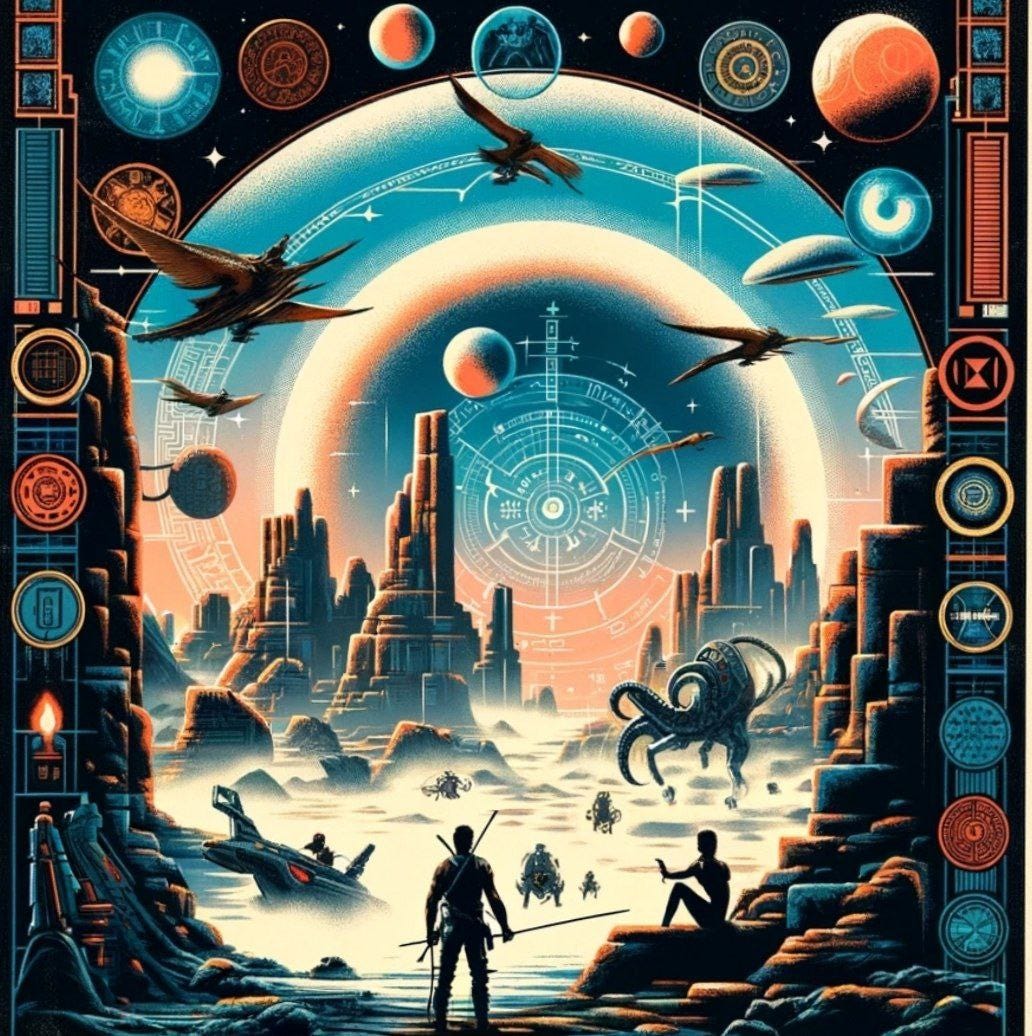Overview
MythOS is a neologism that embodies the synthesis of technological operating systems, organizational frameworks, and the rich tapestry of mythology to propose a revolutionary paradigm for guiding civilizations. It transcends traditional sense-making processes, integrating rational, logical, and quantifiable methods with expansive, imaginal, and archetypal mythmaking. MythOS is not merely a concept but a blueprint for societal evolution, merging the precision of IT systems and business logic with the depth and universality of myths, thus crafting a foundational narrative for collective and individual existence.
Foundations
Technological Synergy: At its core, MythOS draws from the principles of information technology systems, where efficiency, scalability, and adaptability are paramount. It suggests a civilization's infrastructure could be designed with the same intelligence and foresight as the most advanced software, optimizing human resources and capabilities.
Organizational Wisdom: Borrowing from contemporary organizational operating systems, MythOS integrates business logic to ensure that societal functions are streamlined, purposeful, and aligned with overarching goals. This aspect of MythOS emphasizes the importance of roles, responsibilities, and relationships in crafting a cohesive and thriving society.
Mythological Depth: The most distinctive feature of MythOS is its deep integration of mythology into the fabric of societal functioning. Myths are seen not as relics of the past but as living, breathing narratives that shape identity, values, and purpose. Through mythmaking, societies can transcend the limitations of rationality and tap into a collective unconscious, fostering a sense of unity and belonging.
Key Principles
Transcendence and Inclusion: MythOS advocates for transcending traditional modes of sense-making while including them within a larger, more holistic framework of understanding. This principle ensures that logic and reason are not discarded but rather woven into the broader tapestry of human experience.
Archetypal Resonance: By drawing on universal archetypes, MythOS connects individuals and societies to timeless truths and narratives, facilitating a deeper connection to the self and the collective.
Imaginal Activation: MythOS places a strong emphasis on the power of imagination and creativity in crafting societal visions. It suggests that by engaging with the imaginal realm, civilizations can envision and manifest futures that transcend current limitations.
Evolutionary Adaptation: Recognizing the constant flux of the human condition, MythOS is designed to be inherently adaptable, allowing for the evolution of societal structures in response to changing needs and circumstances.
Collective Co-creation: At its heart, MythOS is a collaborative endeavor, inviting participation from all members of society to contribute to the ongoing creation of their collective narrative.
Implementation
Envisioning a society governed by MythOS involves a radical rethinking of constitutional frameworks and legal systems. Laws and regulations would be seen as living documents, subject to reinterpretation and adaptation in line with evolving myths and narratives. Governance would be both decentralized and interconnected, reflecting the networked nature of contemporary technology while fostering a sense of community and shared purpose.
Impact
The adoption of MythOS has the potential to revolutionize how societies operate, moving beyond the constraints of conventional wisdom to embrace a more fluid, dynamic, and inclusive approach to civilization building. By grounding societal development in mythmaking, MythOS offers a path towards a future where technology, organization, and mythology converge to create a world that is not only sustainable and resilient but deeply connected to the human spirit.
Conclusion
MythOS represents a bold step forward in the quest for a more integrated and holistic approach to societal development. By blending the precision of technology, the structure of organizational systems, and the depth of mythology, it offers a framework for civilizations that aspire to not only survive but thrive in an ever-changing world. In the MythOS paradigm, the future of humanity is not written in code or laws but in the stories we choose to believe in and live as.





